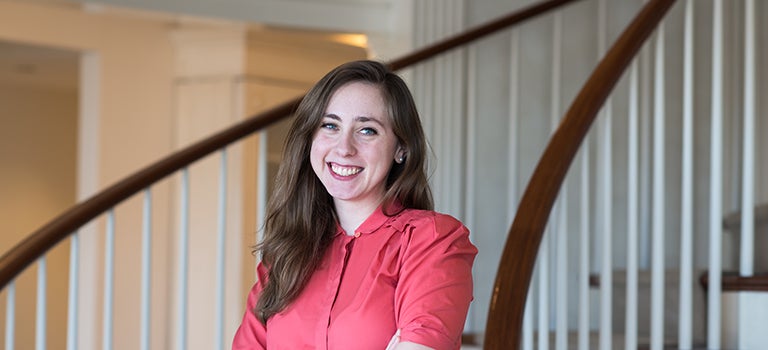Life After Georgetown: Emma Green

Emma Green (C’12) is the assistant managing editor of TheAtlantic.com, where she also writes about religion and culture. Photo by Melissa Nyman.
January 12, 2015—Three years ago, if you’d asked Emma Green (C’12) what she’d be doing after graduation, she probably would have said that she didn’t know. Like many college seniors, Green wasn’t sure how to translate her interests and abilities into a career.
Today, Green is the assistant managing editor of TheAtlantic.com, where she writes about religion and culture and works on website strategy.
“There are all of these career paths laid out for college graduates, where if you take this one-two-three step path you can become a lawyer, or if you take that one-two-three step path you can become a doctor—which is great if that’s what you want to do, but the vast majority of jobs fall outside of those clearly laid out paths,” Green said. “It can be really intimidating to try and figure out where you fit into the spaces of work.”
Green, a former George F. Baker Scholar who majored in government, wasn’t specifically thinking of journalism or media, but knew she wanted a job that allowed her to read and write, talk to people, and analyze ideas. In July 2012, she began a fellowship program with The Atlantic, where she’s been ever since. She started in the events division before moving to the website, where she still works today.
In her work, Green writes about a variety of topics related to faith, religion, and culture, such as how childhood influences church attendance, how religious communities perceive climate change, and marriage equality. Many of Green’s undergraduate studies focused on religion in public life, which she now feels helped to prepare her for her current role.
“I often feel like I stumbled sideways into doing what I do now, but it’s very much a good fit. It’s been surprising how much my education has really come to bear on my work,” Green said. “I may be a bit unique because I cover things that you might study in a seminar [at Georgetown]. But I use political theory all the time—I took this great set of seminars in the College as part of the social and political thought program, and I swear I use those seminars every single day.”
In her first few years on the job, Green has noticed that, while religion is a “shrinking beat” across the industry, many people still love reading about religion and engaging with the topic. “Our readers . . . particularly love reading about tension points where religious identity comes into conflict, or where it [intersects] with a public policy issue,” she said. “I think it’s telling that there’s a hunger for that type of intellectual engagement.”
It’s that same intellectual engagement that Green nurtured at Georgetown, not only through the curriculum she chose, but also through experiences and programs that helped shaped her outlook. But it goes beyond honing skills in small discussion classes, conducting research abroad, or even studying at Catholic university in a modern world.
“Even if undergraduates don’t have an exacting sense of their career paths, if they have a sense of their interests—how they like thinking and working, how they like to spend their time—there can be unexpected ways in which an education can shape your ability to do your job later on down the line,” Green explained.
Which is why Green urges current seniors not to worry—a task that she acknowledges is “very important but almost impossible.”
“Fear and security can be big motivators in what jobs people take and how they pursue different job paths. I was extremely lucky [at Georgetown] to have guidance, but not everyone there does,” Green said, “It’s very easy to feel lost if you don’t know what you want to do, but you have a sense that it’s not doctor, lawyer, or investment banker.”
Green encourages current students to take matters into their own hands. “Look for the interstitial spaces of jobs that you might not even know exist” by talking to people. “Conduct informational interviews; the alumni network is great and Georgetown alums are just wonderful.”
Most importantly, Green says, “don’t let fear motivate your choices.”
Related Information
For more from Emma Green and to read her articles at The Atlantic, follow her on Twitter: @emmaogreen.